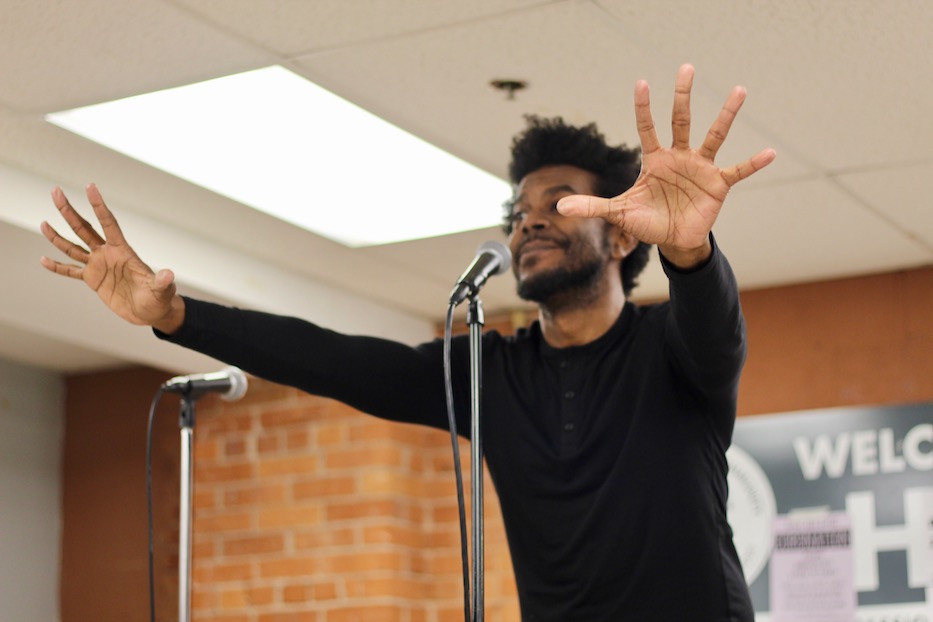
High School in the Community | Poetry & Spoken Word | Arts & Culture | The Word | Arts & Anti-racism
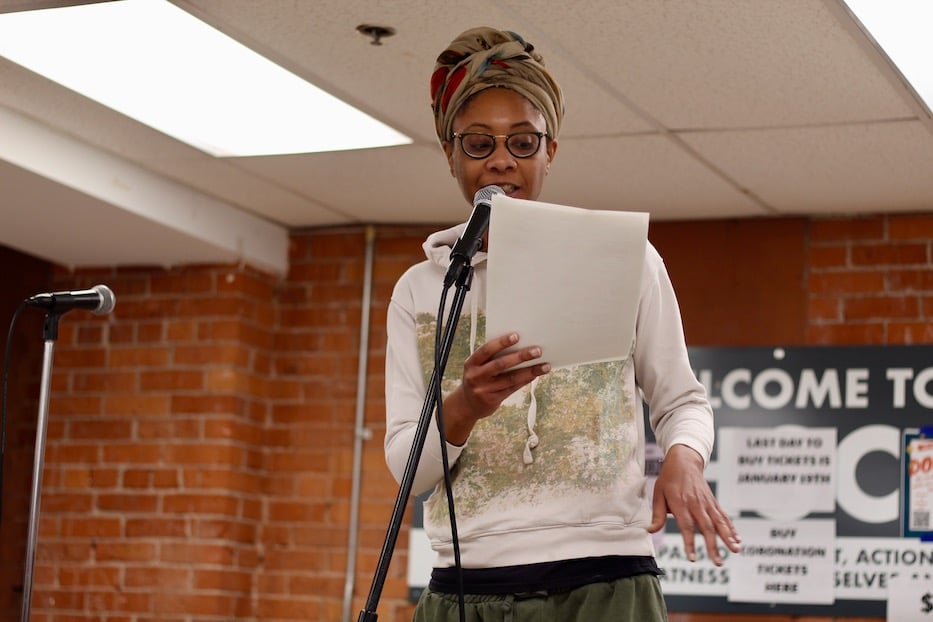
Puma Simone. Lucy Gellman Photos.
Puma Simone began to unfold a story at the mic, ears in the room swiveling their way. Between their hands, decades of New Haven history buzzed and hummed. In the audience, Igmarie Cruz hung onto each word, and started thinking about poetry as a form of release.
“I’ve been a starving artist/Perhaps I got cold feet,” Simone read, looking out over hundreds of faces. “Or was tempted by love and a picturesque dream/A city full of diamonds born and raised to gleam.”
Simone is a poet and spoken word artist in New Haven, where their work has flowed from downtown to the Dixwell Community Q House to Zoom rooms that feel like small blessings. Cruz is a junior at High School in the Community (HSC), where she is head of the school’s Pride ProCo, or Production Company. Wednesday morning, their worlds came together as students packed into HSC’s cafeteria for a visit from Simone and Tarishi Midnight Shuler.
The two were there to spread the word about The Word, a free weekly poetry workshop at Neighborhood Music School each Thursday afternoon at 4:30 p.m. Nearly 280 students, or the school’s entire student body, were in attendance.
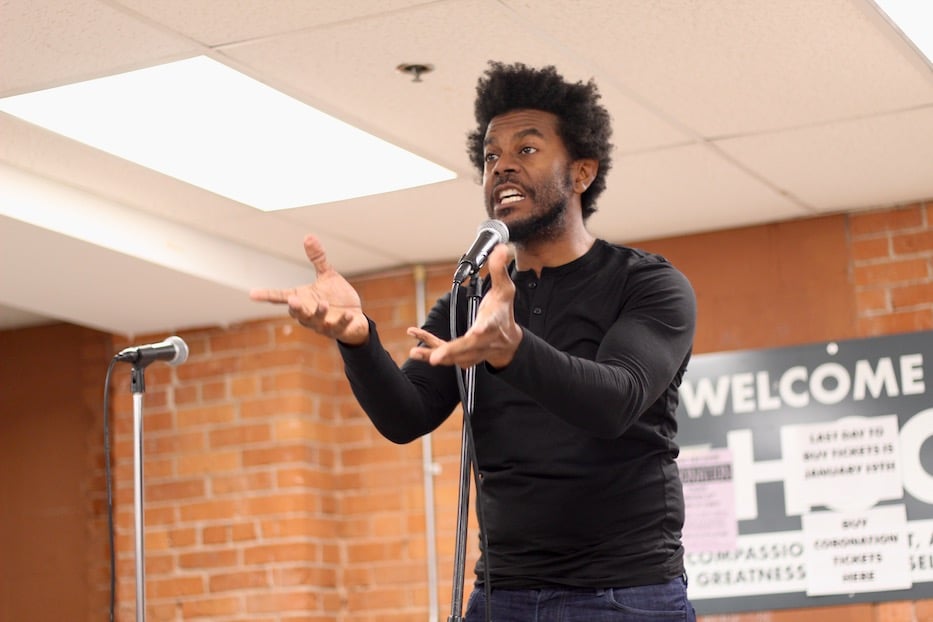
Shuler performing Wednesday.
“No matter what job or profession you want to do in life, poetry will help you do it,” said Shuler, who has been a presence on the city’s spoken word scene for over a decade. “If you don’t believe me, challenge me. You can tell me what profession you want to do and I’ll tell you how poetry will help you master your profession.”
The two had shown it long before Shuler ever said the words. As students poured into the cafeteria, some still waking up, Magnet Resource Teacher Dianna Carter pointed to the event as in lockstep with the school’s CRAIGs (Compassion, Respect, Action, Integrity, Greatness) framework. Offstage, Simone and Shuler looked on as dozens of students became hundreds. In Simone’s hand, a poem stretched over a neat trio of pages, waiting to crackle to life.
“Please send that last text! Do that last selfie!” Carter said as a few latecomers slipped into the front row, still in their winter coats. Around the room, conversations fell to a hush, then stopped all together.
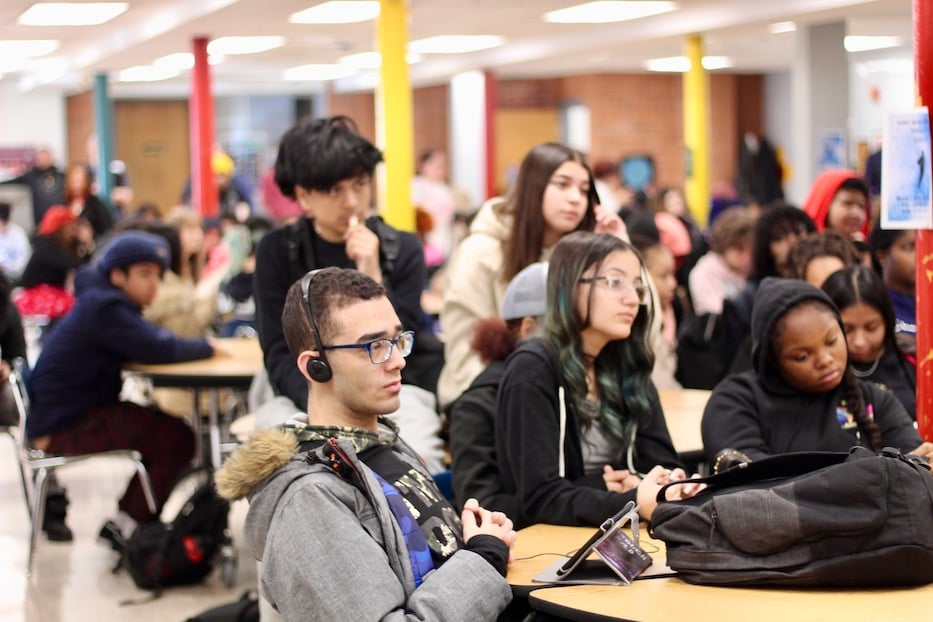
It turned out that they needed no introduction. Taking the mic, Simone opened with a poem they wrote over a year ago, shortly before the city’s cultural equity plan was unveiled on Dixwell Avenue. In every line was a New Haven that was intimate and startlingly familiar, in which a chronic and growing resource gap had penalized artists, organizers, labor and protest leaders, and activists for decades.
“I forgot that an aperture could be broken/That a vignette requires darkness approaching for focus/So in hindsight, no pictures please,” they read, scanning the faces in the room.
“I do not wish to be perceived with sympathy or suspicion by On Scene Media—” a few deep Mmmms wove through the space, “To be pointed to and shot at./No, I don’t want my life to be written by the Times …”
Students were paying attention now, many of them watching closely as Simone wove story out of thin air. They listened as Simone invoked Margaret Holloway, sometimes called the “Shakespeare Lady” of New Haven, who died of Covid-19 in June 2020. During her life, Holloway struggled for years with schizophrenia and mental illness, often the subject of public curiosity rather than the community care she needed and deserved.
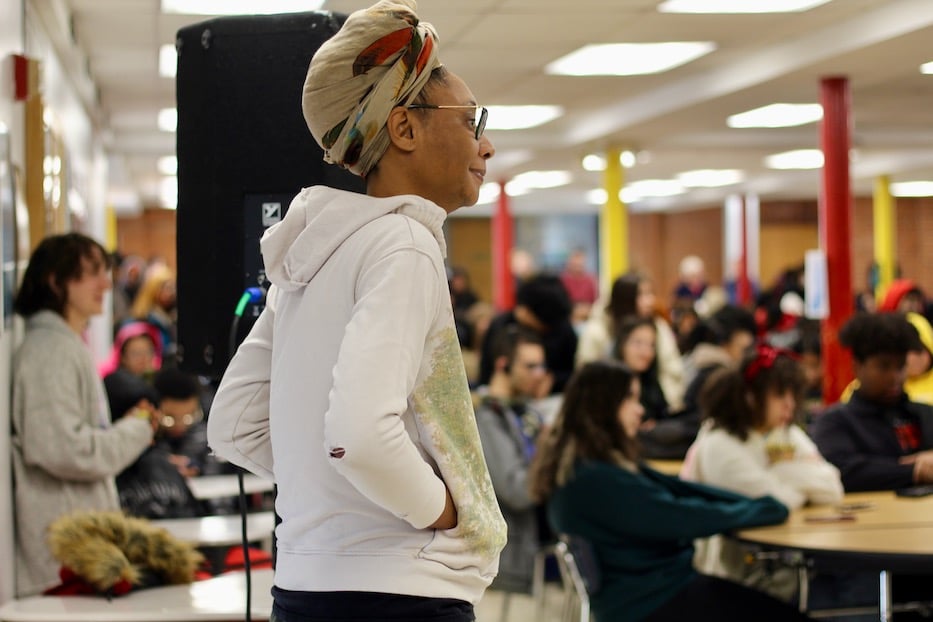
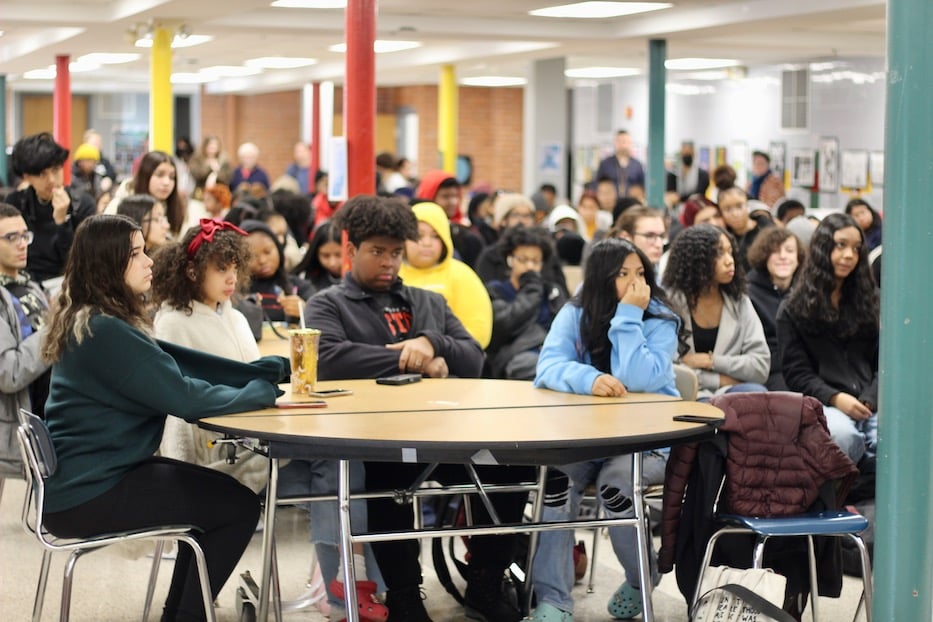
Simone noted that it was a little bit of a full-circle moment to be at HSC, where they were a freshman years ago, before transferring elsewhere.
Looking to what Holloway herself called “the theater of hunger,” Simone painted a portrait of a city in contrasts, where New Haven has become a playground for many of its temporary residents, and a home starved of basic resources for many of its permanent ones. The words rang out across the cafeteria, resonant in a school district that has seen a citywide teacher shortage, struggle with chronic student absenteeism, and reading and math scores that the district itself has described as “crisis.”
“Dixwell, I’m sorry it took so long to rebuild the Q House/I can only imagine what could have been,” Simone read, their voice catching on something. “I pray my imagination can fill in the gaps of brilliance/That my clothes signify a remembrance/An ode to neighborhoods that collected the scattered remains of a party’s dismemberment …”
Some students latched on to each reference; others let them wash over them. When Simone called for the Freddy Fixer Parade to return to the New Haven Green—a line they repeated twice—a student responded aloud that they’d forgotten about the parade in its absence. When they longed for a drum line, murmurs in the audience suggested that a few students did, too. When they referred to New Haveners warmly as the “city’s finest,” there was instant recognition of some truth students knew, too.
When they finished, the room burst into applause.
“How did y’all feel about that poem?!” Shuler asked. “Who wants to comment on it?”
“I liked the language!” shouted out one student from the left side of the room, their hands animated over a lunch table. “Meaningful!” someone yelled from the back.
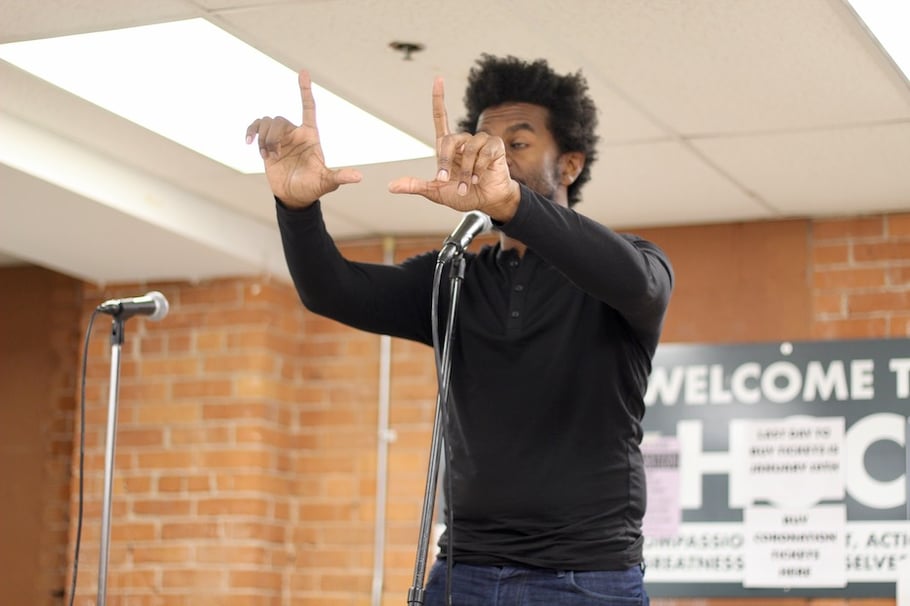
With the mic still hot, Shuler jumped into his poem “The Photographer,” yoking domestic violence that he witnessed as a kid to the history and practice of photography. Within seconds, his limbs were electric, hands extended out in front of him. His index fingers and thumbs popped from his palms at exactly the same time. He framed the audience, students sucking in their breath.
“Funny thing is, guns and cameras are too much alike,” he told the audience, arms constantly in motion. “No. Seriously. Guns. And cameras. Are too much alike. You point. Aim. Shoot. They both fire. One keeps memories. The other takes them away.”
Some students sat up a little straighter, holding even the silences between Shuler’s words. On stage, he traced a through line from photography to police brutality, wooden caskets and picture frames, his young, sweet brain and the trauma he sorted through years later, when confronting the images frozen in his mind.
In tight, lyrical bars, he tied suicidality and generational trauma to the repeated exploitation of Black people, limbs whirring all the while.
“They say a picture is worth 1,000 words,” he read. “Tell me/What does a polaroid say when it’s undeveloped?”
He stuttered as if his tongue was a shutter, jammed suddenly by the force of something he hadn’t seen. In the cafeteria, a few students looked at each other for a moment, as if to ask if it was part of the poem. Then his tongue unfroze, and a rush of words hit the stage.
“Most kids grew up being afraid of the dark/I grew up being afraid of the light/Despite the fact of the smile,” he read. “Every time my father says ‘Cheese,’/All I hear is ‘Freeze!’/Not knowing if I’m posing for a family portrait/Or my own obituary.”
Applause filled the room for the second time that morning. It was his way of telling students—without ever having to use the words—that part of his mission as a poet and teaching artist is to use spoken word as a pathway to healing. 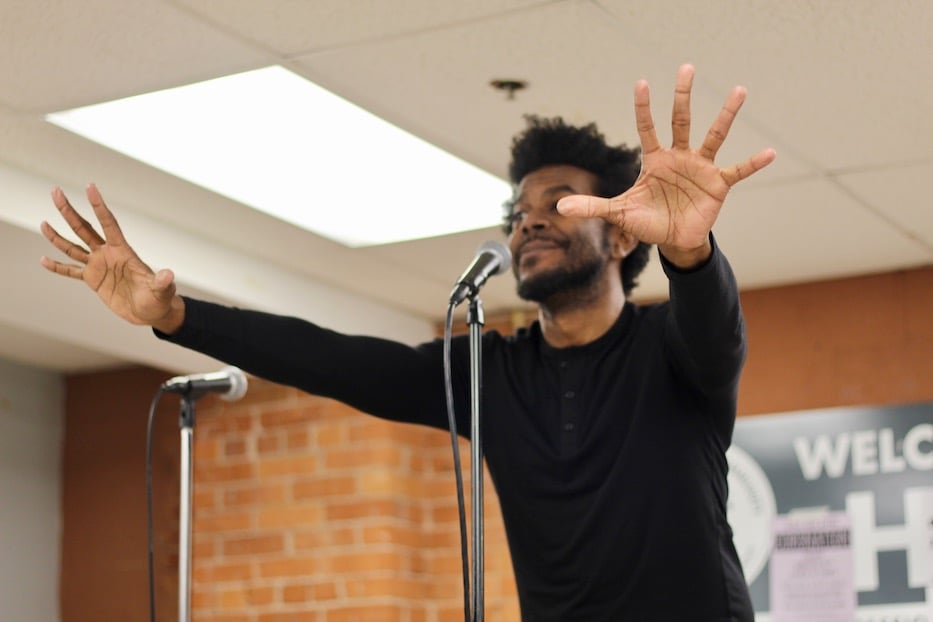
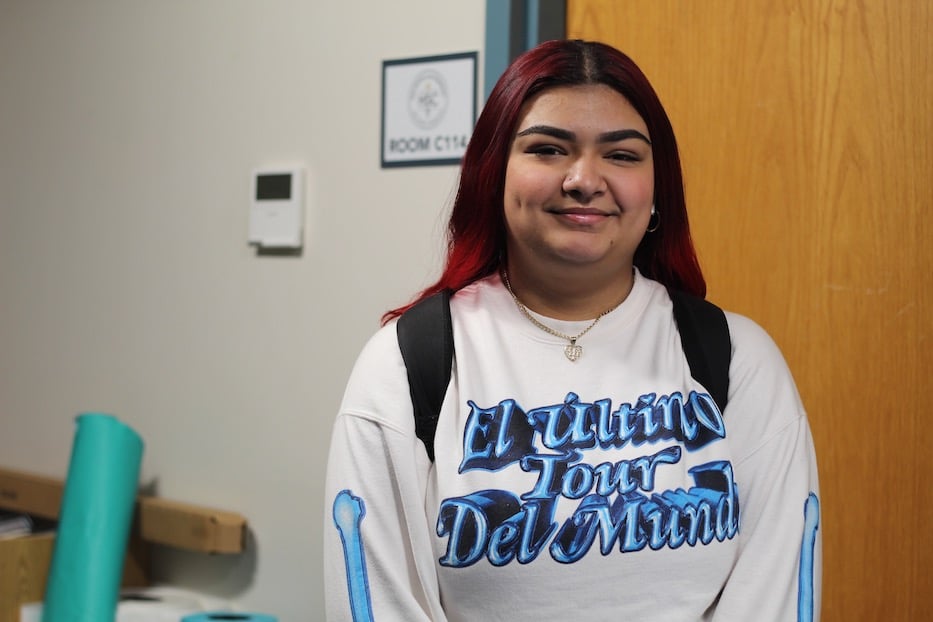
HSC Junior Igmarie Cruz, who goes by Iggy.
“We all go through situations in our life that might be traumatic, that might be terrible, but no matter how dark the situation is, there’s always light at the end of the tunnel,” he said. He ended the morning with an open letter to aliens, begging them not to come to planet earth unless they had a death wish—and were prepared for a uniquely American brand of racism. That is, the brand that grew out of stolen people on stolen land.
Cruz, who started writing “for myself” in eighth grade, said she was moved by the performance. Raised in New Haven, she discovered the power of journaling when she was a student at Hill Central School, and one of her classes introduced writing. She isn’t sure if she’d do spoken word poetry, she said—but was grateful that the morning had brought the form into her school.
“It helped me face my emotions in some kind of way,” she said of creative writing and journaling. “I like to write about what’s going on in life. I’m not super open when it comes to me personally, and it gives me an outlet.”
“I really liked it,” she added of the performance. “I felt like everyone was engaging.”
The Word runs each Thursday from 4:30 to 6 p.m. at Neighborhood Music School, 100 Audubon St. in New Haven. Learn more about the program at its website.

